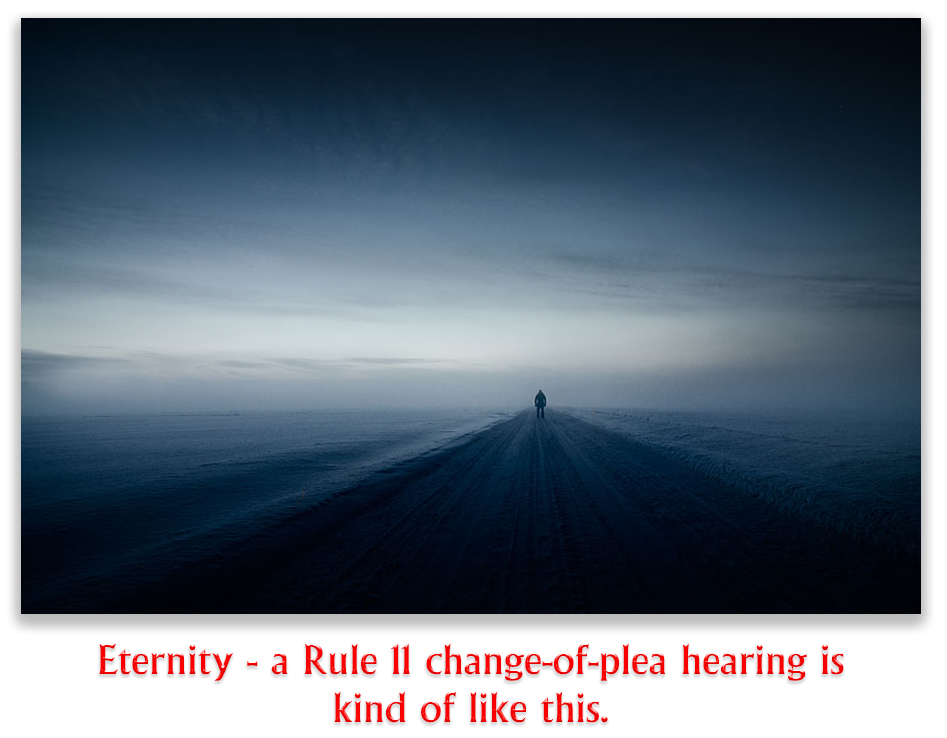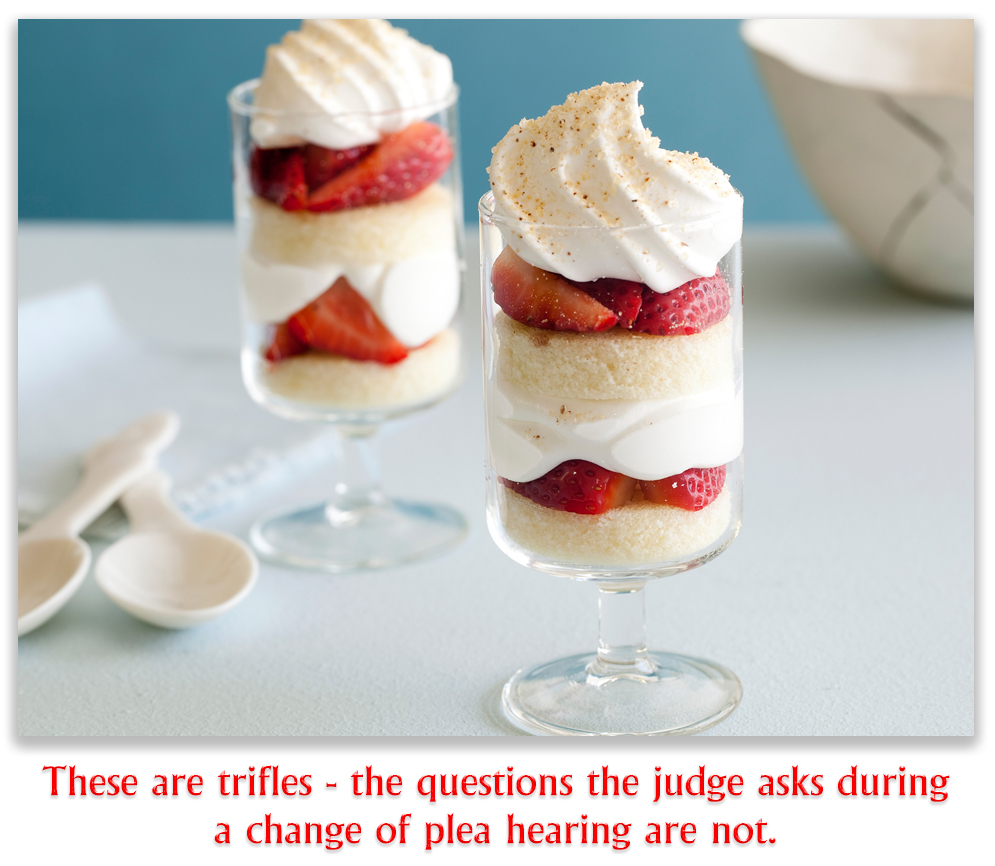We post news and comment on federal criminal justice issues, focused primarily on trial and post-conviction matters, legislative initiatives, and sentencing issues.
MEAN WHAT YOU SAY
 Anyone spectator who has ever endured a change-of-plea hearing in Federal court has some sense of what the prophet Isaiah meant when he wrote of inhabiting eternity. The hearing drones on and on, with discussions about the defendant’s mental state, understanding of his or her rights, the nature of the rights being given up by the guilty plea, the elements of the charges, maximum and minimum sentences, fines and restitution, effect of the Guidelines, and on and on.
Anyone spectator who has ever endured a change-of-plea hearing in Federal court has some sense of what the prophet Isaiah meant when he wrote of inhabiting eternity. The hearing drones on and on, with discussions about the defendant’s mental state, understanding of his or her rights, the nature of the rights being given up by the guilty plea, the elements of the charges, maximum and minimum sentences, fines and restitution, effect of the Guidelines, and on and on.
The whole back-and-forth between the defendant and the judge – known as the plea colloquy – is scripted by F.R.Crim.P. 11, which covers in detail what has to happen during the guilty plea. Such hearings go on over 70,000 times a year in federal court, and virtually every one of them is mind-numbing.
Before accepting a plea of guilty, the court must determine that the plea is voluntary and did not result from force, threats, or promises other than those in the plea agreement. One question that is almost always asked is whether the defendant is fully satisfied with his or her legal counsel, the representation, and advice received. Another is whether anyone had threatened or attempted in any way to force the defendant to plead guilty.
 At first blush, the questions seem silly. If the defendant is being forced to plead guilty, he or she is hardly going to screw the pooch by telling the judge that. Even worse is the question about satisfaction with counsel. The defendant has not even had his or her guilty plea accepted, let alone get sentenced. It’s as though Yelp required you to post your restaurant review before your appetizer arrives. Sure, the maître d’ was polite, and the tablecloths clean and starched. But you may well feel much different at 3 o’clock tomorrow morning, when you discover that e.coli. had been living in the house salad.
At first blush, the questions seem silly. If the defendant is being forced to plead guilty, he or she is hardly going to screw the pooch by telling the judge that. Even worse is the question about satisfaction with counsel. The defendant has not even had his or her guilty plea accepted, let alone get sentenced. It’s as though Yelp required you to post your restaurant review before your appetizer arrives. Sure, the maître d’ was polite, and the tablecloths clean and starched. But you may well feel much different at 3 o’clock tomorrow morning, when you discover that e.coli. had been living in the house salad.
 As meaningless as the answers may be, they nevertheless because granite-hard truth if the defendant ever suffers buyer’s remorse. Consider Kevin Reed. Halfway through his federal fraud trial, he decided to plead guilty. During the plea colloquy, the district judge asked Kevin if he was “fully satisfied with the counsel, representation, and advice” he had been given. Kevin replied, “Yes. He’s excellent.” He also confirmed that no one had threatened him or attempted “in any way” to force him to plead, and that he was pleading guilty of his “own free will” because he was actually guilty.
As meaningless as the answers may be, they nevertheless because granite-hard truth if the defendant ever suffers buyer’s remorse. Consider Kevin Reed. Halfway through his federal fraud trial, he decided to plead guilty. During the plea colloquy, the district judge asked Kevin if he was “fully satisfied with the counsel, representation, and advice” he had been given. Kevin replied, “Yes. He’s excellent.” He also confirmed that no one had threatened him or attempted “in any way” to force him to plead, and that he was pleading guilty of his “own free will” because he was actually guilty.
A few months later, as sentencing loomed, Kevin hired a new set of lawyers. They moved to withdraw the plea, arguing that Kevin’s trial attorney’s ineffective representation at trial left Kevin with no choice but to bail out, and thus coerced him to plead guilty. The district court denied the motion.
Last Tuesday, the 7th Circuit upheld the district court. The Circuit acknowledged that a defendant could withdraw a guilty plea, but such a motion is “particularly unlikely to have merit if it seeks to dispute the defendant’s sworn assurances to the court.”
That was exactly what Kevin was trying to do. He argued that his trial attorney ignored tens of thousands of documents and didn’t interview dozens of potential witnesses, but he did not identify any of the witnesses or documents or show how they would have bolstered his case. More importantly, the appellate panel tartly noted, Kevin kind of forgot to mention any of this in his plea colloquy, or to complain that he was answering “yes” to the court only because his attorney told him to.
 At the plea colloquy, Kevin said his lawyer was excellent and that his plea was voluntary. “Those sworn statements were not ‘trifles’,” the 7th said, that Kevin could simply “elect to disregard.” To be sure, a plea entered because counsel is unprepared for trial would be an involuntary plea, but the district court found Kevin’s claim of lawyer ineffectiveness “vague,” and the appellate court agreed.
At the plea colloquy, Kevin said his lawyer was excellent and that his plea was voluntary. “Those sworn statements were not ‘trifles’,” the 7th said, that Kevin could simply “elect to disregard.” To be sure, a plea entered because counsel is unprepared for trial would be an involuntary plea, but the district court found Kevin’s claim of lawyer ineffectiveness “vague,” and the appellate court agreed.
The problem is that at the change-of-plea colloquy, a defendant – especially one unfamiliar with the criminal process – has no way to know whether his lawyer has provided good representation or not. Nevertheless, a defendant will be held to the words he or she speaks. Whether the defendant knows the correct answer or not, that answer is going to bind him or her. Say it like you mean it, because once you give the answer, you own it.
United States v. Reed, Case No. 16-3428 (7th Cir., June 13, 2017)
– Thomas L. Root
